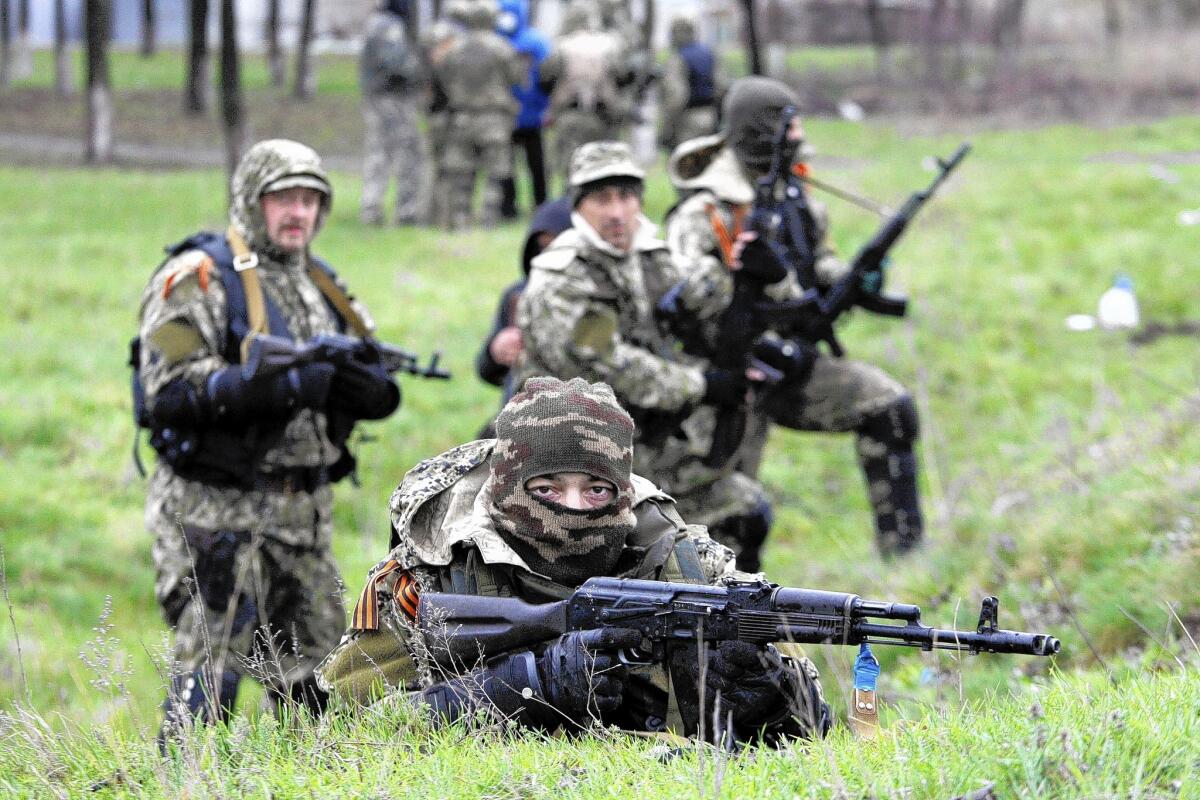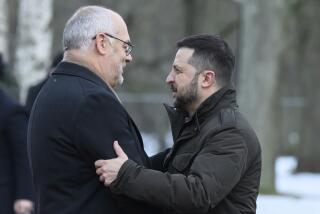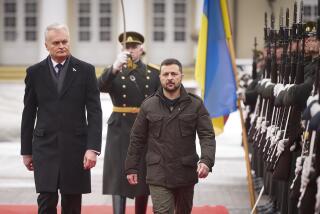Ukraine’s interim leader threatens separatists with crackdown

MOSCOW — Vowing that the Russian takeover of Crimea would not be repeated elsewhere in the east of his country, Ukraine’s interim president gave separatists until Monday to lay down their arms and surrender government buildings they have seized or face a crackdown by military forces.
Those separatists who don’t fire on security forces and who surrender their weapons will not be prosecuted, President Oleksandr Turchynov said Sunday.
“The Council of National Security and Defense has decided to carry out a large-scale anti-terrorist operation with the use of armed forces of Ukraine,” Turchynov said in a televised address Sunday afternoon. “We won’t allow Russia to repeat the Crimean scenario in the eastern region of Ukraine.”
Turchynov also promised concessions to eastern protesters who favor greater autonomy, saying, “We are ready to consider the issues of significantly expanding the powers of the regions and a sweeping reform of local self-management.”
Earlier Sunday, an attempt by security forces to retake government buildings in the eastern town of Slavyansk stalled after a brief shootout that left at least one officer dead and five wounded. Separatists also suffered casualties in the exchange, acting Interior Minister Arsen Avakov said.
Security Service and elite riot police officers had to stop the attack and regroup after discovering that “the separatists are hiding behind a live shield of peaceful residents,” Avakov told the UNIAN news agency.
The day before, gunmen in unmarked camouflage uniforms and masks seized a police station and the local administration building in Slavyansk, about 80 miles north of Donetsk in Ukraine’s coal-mining region. They reportedly handed out weapons captured inside the police station to other activists and raised a Russian flag over the buildings.
Ukraine’s threat to move against the demonstrators prompted Moscow to call an emergency meeting of the United Nations Security Council on Sunday night, during which Russia’s envoy argued that world powers must stop Kiev from using force.
Vitaly Churkin, the Russian representative to the United Nations, said Washington had encouraged the protests in Kiev that toppled the former pro-Moscow government in Ukraine in February.
“So now the U.S. is going to encourage this criminal use of force?” he asked, warning that “in just a few hours’ time things might take an irreversible turn for the worse” in Ukraine.
But the council took no action, and Russia found little support for its arguments that Kiev was responsible for any military confrontation that may be ahead.
Ukraine’s envoy, and four European representatives on the 15-member Security Council, joined the United States in asserting that the seizures of Ukrainian facilities were organized and executed by Russia.
The sophisticated arms carried by the demonstrators “were not something you can buy in an army surplus store,” French envoy Gerard Araud said.
Ukrainian security and intelligence experts have identified some of the attackers as Russian military intelligence commandos who took part in seizing key government facilities in Crimea in February, said Dmitry Tymchuk, a security and defense expert. The takeover of Crimea set the stage for a disputed local referendum backing the peninsula’s annexation by Russia, which followed.
“According to very reliable information, Russian commandos infiltrated eastern Ukraine in small groups earlier in April to seize government premises and police stations and also coordinate similar activities on the part of local separatists financed and backed by Russia and some local pro-Russia oligarchs,” Tymchuk, head of the Kiev-based Center for Military and Political Research, said in a telephone interview. “Their aim is to wreak chaos and further destabilization in the southeast of the country to disrupt the presidential campaign in Ukraine and eventually cause a split-up of the country.”
The interim Ukrainian government fears that a large-scale security operation to retake government buildings might lead to a high number of casualties, Tymchuk said.
“Right now Ukraine leadership is faced with only two options, both being bad and worse: conducting a sweeping combat operation to neutralize terrorists and liberate administrative buildings at the cost of a serious number of casualties, or do nothing and see the eastern regions go adrift toward Russia,” Tymchuk said.
Elsewhere in the east on Sunday, pro-Russia demonstrators and their opponents clashed in the center of Kharkiv, the country’s second-largest industrial city after Kiev, leaving at least 10 people injured, UNIAN reported.
In Yenakiyevo, armed separatists seized a police station and city council building, UNIAN reported. Yenakiyevo is the hometown of former President Viktor Yanukovich, a pro-Moscow leader whose ouster by the political opposition in February led to Russia’s takeover of Crimea.
On Sunday, Russian state television news programs reported that CIA Director John Brennan was in Kiev on Saturday, a secret visit that the reports maintained heralded the interim government’s decision to get tough with separatists.
In Washington, CIA spokesman Todd Ebitz declined to comment on Brennan’s travels but said, “The claim that Director Brennan encouraged Ukrainian authorities to conduct tactical operations inside Ukraine is completely false. Like other senior U.S. officials, Director Brennan strongly believes that a diplomatic solution is the only way to resolve the crisis between Russia and Ukraine.”
About 20,000 people took part in a rally in downtown Moscow on Sunday to protest the annexation of Crimea, Russia’s alleged actions elsewhere in eastern Ukraine and the prevalence of anti-Ukraine propaganda in Russian mass media.
“I remember the days of the Cold War only too well, but even in those days the propaganda on television and in our newspapers was not so outrageously lying,” said Olga Zinovieva, a 58-year-old pensioner. “I am really, really afraid the Kremlin is thus preparing the country for a real war with Ukraine.”
Loiko reported from Moscow and Richter from Washington. Special correspondent Victoria Butenko in Kiev and Times staff writers David G. Savage and Ken Dilanian in Washington contributed to this report.
More to Read
Start your day right
Sign up for Essential California for news, features and recommendations from the L.A. Times and beyond in your inbox six days a week.
You may occasionally receive promotional content from the Los Angeles Times.







